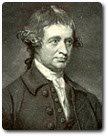Songs of Innocence and Experience Contents
- Social / political context
- Religious / philosophical context
- Literary context
- Textual history
- Songs of Innocence
- Introduction (I)
- The Shepherd
- The Ecchoing Green
- The Lamb
- The little black boy
- The Blossom
- The chimney sweeper (I)
- The little boy lost (I)
- The Little Boy Found
- Laughing song
- A Cradle Song
- The Divine Image
- Holy Thursday (I)
- Night
- Spring
- Nurse's Song (I)
- Infant Joy
- A Dream
- On Another's Sorrow
- Songs of Experience
- Introduction (E)
- Earth's Answer
- The Clod and the Pebble
- Holy Thursday (E)
- The Little Girl Lost
- The Little Girl Found
- The Chimney Sweeper (E)
- Nurse's Song (E)
- The Sick Rose
- The Fly
- The Angel
- The Tyger
- My Pretty Rose-tree
- Ah! Sun-flower
- The Lilly
- The Garden of Love
- The Little Vagabond
- London
- The Human Abstract
- Infant Sorrow
- A Poison Tree
- A Little Boy Lost (E)
- A Little Girl Lost
- To Tirzah
- The Schoolboy
- The Voice of the Ancient Bard
- A Divine Image
An example of Marxist analysis - London
Whilst students need to be aware of how others have approached Blake's work, they also need to keep hold of their own interpretation. No one reading of a text can ever be regarded as the definitive answer to the question of meaning.
The following is an example of how one critical perspective works out in practice, and the pros and cons of solely drawing on such an approach.
An illustration of contemporary politics
The critic E.P. Thompson gives a long analysis of London in Marxist terms. He sees it entirely as an expression of Blake's political views, which reflected the political views current in the Dissenting circles in which Blake moved. Thompson begins from the premise that no knowledge of Blake's vision is necessary for understanding London. On the contrary, this poem helps readers to understand the other texts.
Thompson's analysis is too long to consider in its entirety. We will look here simply at his reading of three major images: ‘charter'd', ‘marks' and ‘mind-forg'd manacles'.
The significance of ‘charter'd'
Thompson starts by looking at an earlier draft of the poem in which ‘chartered' is linked with:
- Cheating
- The notion of the hireling, a term used to refer to corrupt politicians who were concerned for their own gain.
Thompson sees the combination of ideas as an ‘obvious political allusion'.
The critic goes on to look more deeply at ‘charter'd'. The first link, with cheating, he associates with the world of commerce, especially with chartered companies which he describes as ‘bastions of privilege'. He then looks at how this term is used by two very different contemporary politicians:
- Edmund Burke, the voice of the conservative politician, defending the status quo in society
- Tom Paine, the radical voice, demanding change and universal rights.
 Burke finds the term ‘chartered' very positive. He sees charters, which give freedoms to citizens of British cities, as something to be championed against the notion of general ‘human rights'. Thompson then points out that Burke's imagery suggests that he is thinking of the freedoms of those who have money and land, not the ordinary working man.
Burke finds the term ‘chartered' very positive. He sees charters, which give freedoms to citizens of British cities, as something to be championed against the notion of general ‘human rights'. Thompson then points out that Burke's imagery suggests that he is thinking of the freedoms of those who have money and land, not the ordinary working man.
Paine, however, sees charters as negative. They are exclusive. Thompson echoes Paine's views, saying:
The significance of ‘marks'
Thompson links ‘marks' to Revelation 13:16-17, the ‘mark of the beast'. This was interpreted as a sign of the authority of coercive capitalist societies. Blake's fellow Dissenters would have understood this reference in terms of the overturning of the corrupt social system of their day.
The significance of ‘mind-forg'd manacles'
Thompson links ‘mind-forg'd manacles' to Blake's use of the idea in an early work King Edward the Third and his notebooks. From this, the critic determines the meaning of these manacles as being fetters:
The pros and cons of a purely political interpretation
Thompson's approach is totally historical, placing Blake in his social and political context. However, this leaves no room for anything which might come into Blake's work from his own personal experience or emotional life. For example, Thompson only gives weight to the political dimension of Blake's religious thought. His interpretation, therefore, excludes any consideration of the mythology that Blake was developing. Thompson also contradicts himself. He says that there is no need to know anything of Blake's vision but he still draws on Blake's earlier writing, his draft of the poem and his notebooks, in order to establish his Marxist interpretation.
The merit of Thompson's analysis is that it does ensure that we see Blake in his social and political context. It avoids unfounded speculation about his inner life. Its weakness is that he excludes all the personal elements in Blake's vision, especially those which relate to his understanding of the human person. Thompson can only see the poetry as having social and political dimensions. He is also concerned with what Blake says while neglecting the language and forms he uses. There is very little sense of Blake as an artist in his approach.
- English Standard Version
- King James Version
